What is a ‘TERF’? Meaning of the term explained, where it came from - and is JK Rowling one?
and live on Freeview channel 276
The human language is one that is always evolving, with new words and terms making their way into mainstream vocabulary, such as “woke”, “gaslighting” and “cancel culture”.
One such term that has been growing in use is that of the word “TERF”.
Advertisement
Hide AdAdvertisement
Hide AdIn 2020, Harry Potter author JK Rowling’s comments on the transgender community saw the writer mention the topic of TERFs for the first time.
It has since been defined as a word that describes anti-trans activists.
Comedians like Dave Chappell, actor Bette Middler and singer Macy Gray have all been called a Terf on social media in recent times.
If you’re not sure what it means or where it came from, then this is absolutely everything you need to know.
What does the term ‘TERF’ mean?
Advertisement
Hide AdAdvertisement
Hide AdTERF is an acronym which stands for: Trans Exclusionary Radical Feminist.
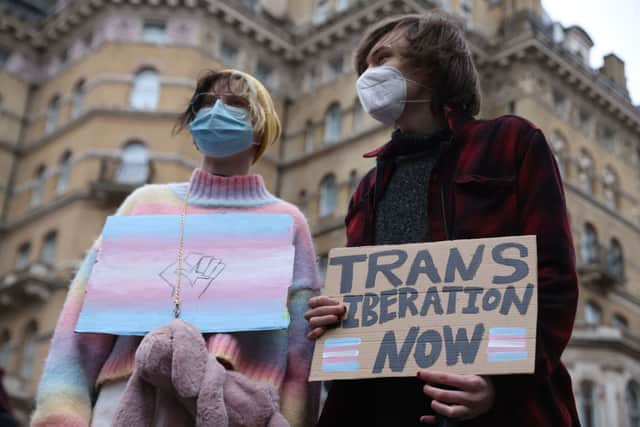

It refers to a person who regards themselves as a feminist, but does not include the rights of transgender women in their advocacy for women’s rights.
In simple terms, TERFs are essentially anti-trans activists.
TERFs do not consider trans women to be “real women” or trans men to be “real men”.
Advertisement
Hide AdAdvertisement
Hide AdThey typically believe that the rights of transgender people - specifically trans women - actually pose a danger to the rights of cisgender women.
For context, cisgender refers to a person who identifies with their gender assigned at birth.
TERFs claim that including trans women in things like female only spaces (for example, bathrooms) pose a threat to cisgender women, often categorising trans women as men looking to abuse the system and harm women.
Many TERFs also promote their ideology under the guise of protecting lesbians and the rights of lesbians as well.
Advertisement
Hide AdAdvertisement
Hide AdThis can be found in small, but vocal, groups like Get the L Out, a lesbian activism group which says that it is “witnessing how transactivism erases lesbians, and silences and demonises lesbians who dare to speak out”.
The Get the L Out website also states that “lesbians are same-sex attracted”, “lesbians do not have penises” and “lesbians do not want to have sex with men who identify as trans-women”.
These beliefs are held in spite of scores of research by psychologists, medical professionals and academics which prove these ideas to be wrong.
Research has found on numerous occasions that transgender people are at a much higher risk of crime than cisgender people.
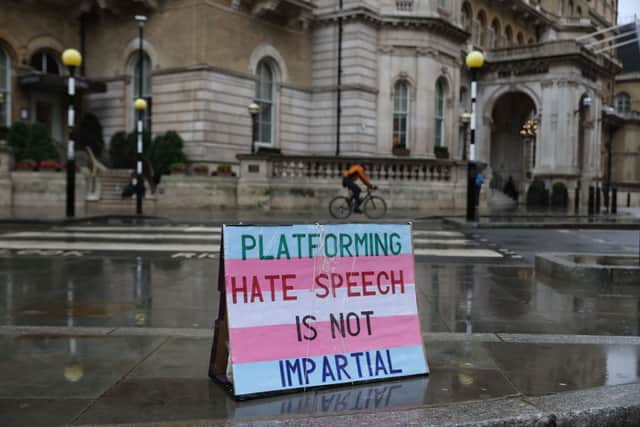

Advertisement
Hide AdAdvertisement
Hide AdIn 2020, data from the Office for National Statistics found that transgender people in England and Wales were twice as likely to be victims of crime versus their cisgender counterparts.
In 2021, the Williams Institute UCLA School of Law also found that “transgender people are over four times more likely than cisgender people to experience violent victimisation, including rape, sexual assault, and aggravated or simple assault”.
In 2017, famous scientist Bill Nye addressed the topic of gender in his Netflix series Bill Nye Saves the World.
In it, Nye says: “Female or male. Gay or straight. Pink or blue. We are taught to see these as binary. Now, we’re realising it’s more like a kaleidoscope.”
Advertisement
Hide AdAdvertisement
Hide AdHe adds: “Take sex. We used to think it was pretty straight forward. X and a Y chromosome for males, two Xs for females. But we see more combinations than that in real life. And even for people with just two sex chromosomes, hormones can vary wildly. So can anatomy.”
He says that “we have to listen to the science” and that “the science says we’re all on a spectrum”.
Is TERF a slur?
While some align themselves proudly with the label, you may have heard others brand the term as a slur.
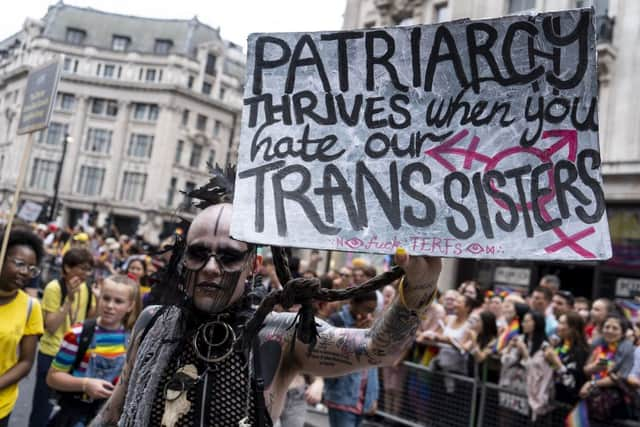

Andrea Long Chu, an American writer and critic, responded to those who claim that the term is a slur in an issue of N Plus One magazine, in which she wrote: “They also don’t much like the name TERF, which they take to be a slur - a grievance that would be beneath contempt if it weren’t also true, in the sense that all bywords for bigots are intended to be defamatory.”
Advertisement
Hide AdAdvertisement
Hide AdPeople who would generally be called a TERF have tried to rebrand themselves and the movement as “gender critical” feminism, which is a term you will often hear in regards to discussions about TERFs and transgender issues.
Where did it come from?
An Australian writer called Viv Smythe has been fairly widely credited with coining the word, although, by her own admission in an opinion piece for the Guardian, has said she suspect’s that she is “merely the first person who wrote it on a website that still exists”.
In the piece, she says: “I wonder how many Elizabethans already used words now attributed to Shakespeare long before he (or the Jacobean actors whose annotated Folio transcripts are the earliest extant versions) incorporated them in a play?”
A 2008 post on her blog, Feminism 101 FAQ, appears to be the earliest instance of the use of the word Terf online.
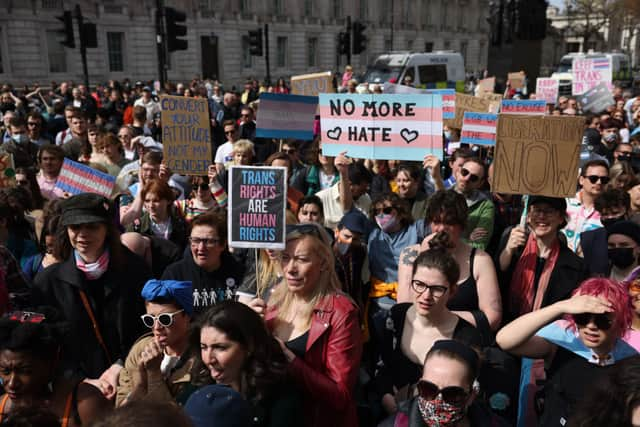

Advertisement
Hide AdAdvertisement
Hide AdIt crops up in a post in which Smythe is apologising for posting about an event called Michigan Womyn’s Music Festival, which excluded trans women as festival participants.
She promises not to give any trans-exclusionary feminist events any promotion in the future.
She wrote: “I am aware that this decision is likely to affront some trans-exclusionary radical feminists (TERFs), but it must be said: marginalising trans women at actual risk from regularly documented abuse /violence in favour of protecting hypothetical cis women from purely hypothetical abuse/violence from trans women in women-only safe-spaces strikes me as horribly unethical as well as repellently callous.”
Is JK Rowling a TERF?
Harry Potter author JK Rowling has been labelled as a TERF due to her stances on the transgender community.


Advertisement
Hide AdAdvertisement
Hide AdShe was first described as a TERF in 2019 after she tweeted her support for Maya Forstater, a woman whose job contract at the Centre for Global Development was not renewed following tweets she made about transgender people, writing things such as “men cannot change into women” and “it is unfair and unsafe for trans women to compete in women’s sport”.
At the time, Rowling tweeted: “Dress however you please. Call yourself whatever you like. Sleep with any consenting adult who’ll have you. Live your best life in peace and security. But force women out of their jobs for stating that sex is real? #IStandWithMaya #ThisIsNotADrill.”
While this did cause a stir at the time, it was a few months later that Rowling really doubled down on the topic.
In June 2020, Rowling took issue with an article which used the phrase “people who menstruate”.
Advertisement
Hide AdAdvertisement
Hide AdShe tweeted the article and wrote: “”People who menstruate.” I’m sure there used to be a word for those people. Someone help me out. Wumben? Wimpund? Woomud?”
In response to her tweet, many pointed out that menstruation is not a something which is exclusively experienced by cisgender women.
Twitter users highlighted that transgender men experience menstruation, transgender (and some cisgender) women don’t, and other gender identities across the spectrum can also experience periods as well.
Clue, an app designed to track menstrual cycles, also responded to her tweet, writing: “Hi @jk_rowling, using non-gendered language is about moving beyond the idea that woman = uterus. Feminists were once mocked for wanting to change sexist language, but it’s now common to say firefighter instead of fireman.
Advertisement
Hide AdAdvertisement
Hide Ad“It seems awkward right now to say “people who menstruate” but this is just like changing other biased language. Menstruation is a biological function; not a “woman thing”. It’s unnecessary to gender body parts and doing so can restrict healthcare access for those who need it.”


Over the following weeks and months, Rowling went on to publish a long personal essay titled J.K Rowling writers about her reasons for speaking out on sex and gender issues.
She tweeted about the essay with the caption “TERF wars”.
In the essay, Rowling wrote: “I want trans women to be safe. At the same time, I do not want to make natal girls and women less safe.
“When you throw open the doors of bathrooms and changing rooms to any man who believes or feels he’s a woman - and, as I’ve said, gender confirmation certificates may now be granted without any need for surgery or hormones - then you open the door to any and all men who wish to come inside.”
Advertisement
Hide AdAdvertisement
Hide AdA number of studies, however, have found that the implementation of nondiscrimination laws, which allow transgender people to use the correct bathroom for their gender identity, have not led to any increase of criminal activity.
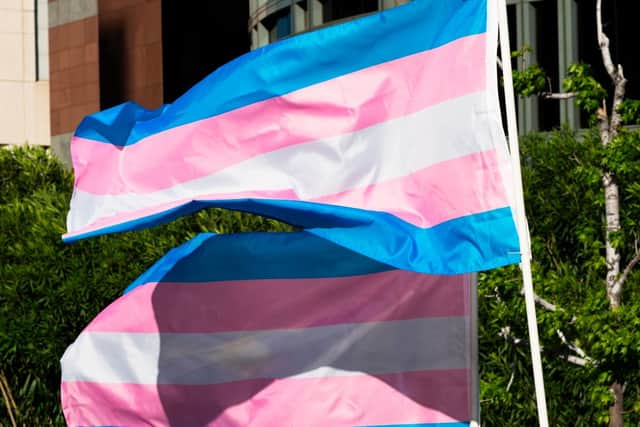

A 2018 study from the Williams Institute at UCLA School of Law found that the passage of nondiscrimination laws “is not related to the number or frequency of criminal incidents in these spaces”.
The study added: “This study provides evidence that fears of increased safety and privacy violations as a result of nondiscrimination laws are not empirically grounded.”
Media Matters also reported in 2015 that, after confirming with experts and officials in 12 states and 17 school districts in the US, there was no increase in sex crimes or inappropriate behaviour after implementing nondiscrimination laws.
Advertisement
Hide AdAdvertisement
Hide AdHer comments online sparked backlash from fans, as well as from fellow celebrities such as Harry Potter stars Daniel Radcliffe, Emma Watson and Rupert Grint, and others including Jonathan Van Ness, fellow author Margaret Atwood, Pete Davidson and more.
Rowling has came out in support of other stars who have been criticised for sharing “transphobic” statements.
In July 2022, she tweeted in support of Macy Gray after she made comments about the trans community on Piers Morgan Uncensored.
The author took to Twitter sharing: “Today feels like a good day to ensure I’ve bought @MacyGraysLife’s entire back catalogue.”
Comment Guidelines
National World encourages reader discussion on our stories. User feedback, insights and back-and-forth exchanges add a rich layer of context to reporting. Please review our Community Guidelines before commenting.
